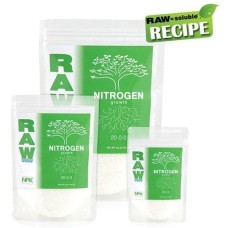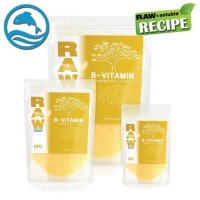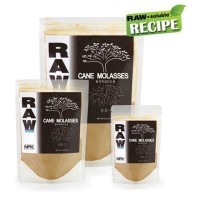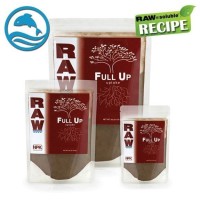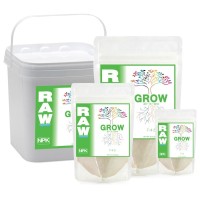Nitrogen by RAW Solubles
Nitrogen by RAW Solubles
Product Options
-
£7.95
In Stock
Nitrogen: Essential Macro-Element for Growth
RAW Nitrogen is an essential macro-element for plant growth, used in relatively large quantities by the plant. In the first half of a plant’s life, the plant will assimilate 80% of the nitrogen needed for its entire growth cycle. Therefore, most high-quality hydroponic grow formulas have a relatively high nitrogen: potassium ratio (N :K) compared to a bloom formula. A typical N:K ratio for a vegetative growth nutrient is about 1 :1.5, or about one and a half times more potassium than nitrogen. The N:K ratio for a typical fruiting and flowering formula is usually about 1 :2, or about twice as much potassium as nitrogen.
Plants take up nitrogen in two different forms: nitrate-N or ammonium-No If you look at the label on any fertilizer bottle, an N-P-K ratio is given. For example, if a fertilizer has an N-P-K ratio of 3-1-5, it has 3% Nitrogen, 1% Phosphorus (as P202) and 5% Potassium (as K20). If you look at the back of the bottle, the forms of nitrogen are further broken down into the percentage of nitrate-N and ammonium-No A typical hydroponic base nutrient contains at least 90% of its nitrogen in the nitrate form, and no more than 10% of its nitrogen in its ammonium form.
Don’t add too much Nitrate!
Many growers unknowingly over-fertilize with nitrogen, especially nitrate-No Nitrate-N is a “luxury” element. In other words, if you give your plants extra nitrate, the plant will take it up, whether the plant needs it or not! Over 30% of the energy of photosynthesis is burned just to take up nitrates. So if you add too much nitrate nitrogen, the plant burns up its energy reserves for more top growth, but root growth is inhibited. The plants may look lush and dark green, but the plant will be weakened. Plants supplied with excess nitrates will produce large cells with thin cell walls, making them more susceptible to stress and disease, and excessive nitrates can delay or even prevent flowering! Stored nitrates in plant tissues can also give rise to off-flavours, and they are generally considered unhealthy. In fact, in Europe if nitrate levels are too high in the plant tissue, the produce will lose its organic certification ,even if all-natural fertilizers are used.
But Avoid Nitrogen Deficiency
On the other hand, it is also very important to avoid a nitrogen deficiency. Nitrogen deficiency shows up as a general chlorosis (or yellowing) of the plant leaves. A little ammonium-nitrogen is a quick fix. Plants will take up the ammonium ions immediately, without accumulating excess nitrates in the process. Ammonium nitrogen can also be used as a light foliar feed to quickly green up the plant. Professional growers manipulate the ammonium:nitrate ratios of the nutrient solution to maximize quality and yield. For example, a “hard water” nutrient formula will have a higher ammonium to nitrate ratio to help stabilize pH. The ammonium ion is positively charged. So as the plant takes up ammonium ions, it exchanges positively-charged H+ ions from the roots. This tends to neutralize excess bicarbonate ions in well water and help drive the pH down. On the other hand, the nitrate ion is negatively charged. So as the plant takes up nitrates, it exudes negatively-charged bicarbonate or OH- ions from the roots, tending to drive the pH up. Therefore, increasing the ammonium to nitrate ratio can help stabilize pH problems in well water.
Unlike nitrate nitrogen, ammonium nitrogen is assimilated directly by the roots for immediate use by the plant, without burning up excess carbohydrates in the process. Under high light and C02 conditions, extra ammonium ions can be very beneficial. If carbon dioxide is supplemented to levels above 750 ppm, plants will preferentially take up carbon molecules over nitrate-N, limiting protein production. If more of the nitrogen is provided in the ammonium form, however, the plant can utilize it directly for increased protein production under high C02 and light conditions. Just don’t overdo it! Ammonium nitrogen can become toxic to plants at even modest levels, producing soft, “rank” growth, especially in cool, low-light conditions.
Tags: Nitrogen, RAW, Solubles, Powder, Dry, Nutrients, Individual
Q & A
Be the first to ask a question.


